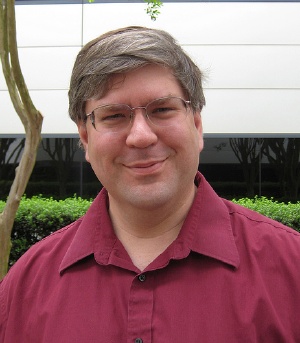U.S. Department of Energy's Argonne National Laboratory researcher John W. Lewellen was recently named a recipient of the U.S. Particle Accelerator School (USPAS) Prize in Accelerator Physics and Technology. He will receive the award at the 2009 Particle Accelerator Conference in Vancouver, Canada, in May.
 John W. Lewellen of Argonne National Laboratory received a 2009 U.S. Particle Accelerator School Prize in Accelerator Physics and Technology.
John W. Lewellen of Argonne National Laboratory received a 2009 U.S. Particle Accelerator School Prize in Accelerator Physics and Technology.
The USPAS prize honors individuals by recognizing their outstanding achievements over the full range of accelerator physics and technology. The prizes are awarded on a competitive basis without bias to race, sex or nationality. Two USPAS achievement prizes are awarded every two years; one of the prizes will be awarded to a young scientist under 45 years of age. He will receive a certificate of merit and a cash award of $3,000.
Lewellen graduated in 1991 from Case Western Reserve University with a B.S. degree in physics and a minor in the history of science and technology. He received his Ph.D. in applied physics from Stanford University in 1997.
After graduating, Lewellen became a staff scientist at the Advanced Photon Source (APS) at Argonne. There, he worked on the Low-Energy Undulator Test Line self-amplified spontaneous emission free-electron laser, the first SASE-FEL to lase and saturate in the visible region and with demonstrated wavelength tuning range of 130-660 nm. His other work at the APS has included development of novel, high-brightness electron beam sources and variable-period undulator technology, and has led to numerous publications and three patents. While at the APS, he served as linac manager and deputy group leader for the accelerator physics group.
In 2004, Lewellen helped found the Argonne-Office of Naval Research Project Office (now the Argonne-Department of Defense Project Office) to coordinate directed energy-related research between Argonne and the various Department of Defense research organizations.
Lewellen was granted a joint appointment with Northern Illinois University, DeKalb, Ill. Also in 2007, Lewellen accepted a position of Research Associate Professor at the Naval Postgraduate School, Monterey, Calif.
The U.S. Particle Accelerator School provides educational programs in the field of beams and their associated accelerator technologies not otherwise available to the community of science and technology. We also promote the development and publication of advanced technology textbooks.